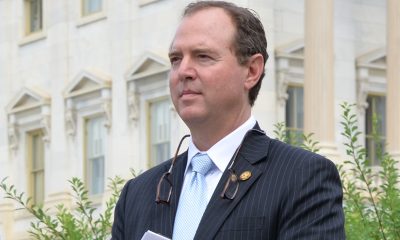National
Report finds limited difficulty in lifting ‘Don’t Ask’
Gates urges Congress to repeal ban by year’s end


Defense Secretary Robert Gates has renewed his call for Congress to repeal "Don't Ask, Don't Tell" by the year's end. (Blade photo by Michael Key)
The Pentagon on Tuesday released its long-awaited “Don’t Ask, Don’t Tell” report — which found open service can be implemented in the armed forces with limited disruption to the military — as Defense Secretary Robert Gates renewed his call for Congress to repeal the gay ban by the year’s end.
“Now that we have completed this review, I strongly urge the Senate to pass this legislation and send it to the president for his signature before the end of this year,” Gates said during a news conference.
Gates continued that legislative repeal of “Don’t Ask, Don’t Tell” is a “matter of some urgency” because of pending litigation that could strike down the statute.
“It is only a matter of time before the federal courts are drawn once more into the fray with the very real possibility that this change would be imposed immediately by judicial fiat — by far the most disruptive and damaging scenario I can imagine,” Gates said.
Still, the defense secretary also said the military would need some time to prepare for open service even after Congress repeals the statute. Gates noted that pending legislation before Congress would end “Don’t Ask, Don’t Tell” only after he, the president and the chairman of the Joint Chiefs of Staff certify that the U.S. military is ready for repeal.
“I believe it would be unwise to push ahead with full implementation of repeal before more can be done to prepare the force — in particular, those ground combat specialties and units for what could be a disruptive and disorientating change,” Gates said.
Gates said he doesn’t know how long it would take for the U.S. military to make the changes necessary before he can certify that open service can happen in the military. Still, Gates said if Congress enacts repeal, President Obama would be “watching very closely that we don’t dawdle or try to slow-ball this.”
“I think his expectation would be that we prepare as quickly as we properly and comprehensively could, and then we’d be in a position to move toward certification,” Gates said. “But how long it would take, I don’t know.”
For the first time, Gates also expressed his personal opposition to “Don’t Ask, Don’t Tell” because the law comprises the integrity of gay service members.
“One of the things that is most important to me is personal integrity,” Gates said. “A policy or a law that in effect requires people to lie gives me a problem.”
Majority of troops don’t care about gays in military
The defense secretary made his remarks as part of his endorsement of the Pentagon report, which found little potential disruption in lifting the military’s gay ban should Congress repeal “Don’t Ask, Don’t Tell.”
Gates said the findings of the report “reflect nearly ten months of research and analysis along several lines of study” and “represent the most thorough and objective review ever of this difficult policy issue and its impact on the American military.”
Chairman of the Joint Chiefs Adm. Mike Mullen, who also took part in the news conference, said he also fully backs the report. Mullen has already testified before the Senate that supports open service in the U.S. military.
“For the first time, the chiefs and I have more than just anecdotal evidence and hearsay to inform the advice we give our civilian leaders,” Mullen said.
In the executive summary for the 256-page report, the “Don’t Ask, Don’t Tell” working group co-chairs Jeh Johnson, the Pentagon’s general counsel, and Army Gen. Carter Ham, commander of U.S. Army Europe, write that based on their findings, the risk of repeal “to overall military effectiveness is low.”
“We conclude that, while a repeal of Don’t Ask, Don’t Tell will likely, in the short term, bring about some limited and isolated disruption to unit cohesion and retention, we do not believe this disruption will be widespread or long-lasting, and can be adequately addressed by the recommendations we offer below,” Johnson and Ham write.
The report includes the results of a survey sent to 400,000 service members over the summer to solicit their views of gays serving openly in the military. According to the report, more than 115,000 of the surveys, or about 28 percent, were returned.
As earlier reported in November by the Washington Post, 70 percent of service members said alongside an openly gay person would have positive, mixed or no effect on their unit’s ability to get the job done.
The survey also found that 69 percent of respondents believe they have served alongside someone they believed to be gay. Of these respondents, 92 percent said their unit’s ability to work together was either very good, good or neither good nor poor.
Still, the survey found a significant minority who predicted negative consequences as a result of repeal — most notably in the Marine Corps.
While 30 percent of survey respondents overall had negative views on open service, around 40 to 60 percent of respondents in the Marine Corps and others in various combat arms specialties expressed concerns about serving alongside openly gay people.
During the briefing, Gates said this discontent with repeal among these groups has made the service chiefs of the Army, Air Force, Navy and Marine Corps “less sanguine” about the prospects on open service. Each of these service chiefs were set to testify on Friday before the Senate on the views on the report.
Still, Gates said the views on the combat troops on implementing open service “do not present an insurmountable barrier” to repeal of “Don’t Ask, Don’t Tell.”
“However, these findings do lead me to conclude that an abundance of care and preparation is required if we are to avoid a disruptive and potentially dangerous impact on the performance of those serving at the tip of the spear in America’s wars,” Gates said.
Implementing open service
Accompanying the larger report is an 87-page support plan to guide implementation of open service in the U.S. military. The guide emphasizes that the key implementation message for successful repeal is “leadership-professionalism-respect.”
For leadership, the guide states that leaders in the chain of command must set the example for open service. For professionalism, the guide advises leaders to remind service members of their obligations and oath to defend the U.S. Constitution. For respect, the guide states that unit strength derives from treating other service members with respect.
The report also notably states the building separate rooming quarters for gay and straight service members won’t be appropriate for implementing open service.
“Building separate facilities would create divisions within units and inappropriately isolate a portion of the force,” the support plan states.
In March, former Marine Corps Commandant Gen. James Conway has raised the idea of separate quarters when he said they might be necessary in his service as a result of open service. The Marine Corps is unique among other services because Marines bunk together on base in the same room.
Despite the recommendation against building separate quarters, Johnson said during the Tuesday news conference that commanding officers may be able to make different housing arrangements from service members as result of open service in some circumstances.
“We’re noting that commanders should retain the discretion on an individualized case-by-case basis to address concerns, particular concerns about privacy,” Johnson said. “And this is discretion they have right now. If a service member has a particular concern about an issue with privacy or can’t get along with someone with whom he’s been assigned a room, a commander has discretion to deal with that.”
The guide also makes recommendations for partner benefits for gays serving in the military. Ham said if “Don’t Ask, Don’t Tell” is repealed, the U.S. military would only to continue to observe federally recognized marriages, which would be in accordance with the Defense of Marriage Act.
Still, Ham said a repeal of “Don’t Ask, Don’t Tell” would mean the same-sex partners of service members would be entitled to hospital visitation rights and death benefits.
“With regard to the hospital visits and death gratuities and the like, if the law is repealed, then we believe that are a number of benefits to which servicemembers are entitled that are servicemember-designated,” Ham said. “And we believe that the examples that you offer would likely fall into that category.”
New York
Two teens shot steps from Stonewall Inn after NYC Pride parade
One of the victims remains in critical condition

On Sunday night, following the annual NYC Pride March, two girls were shot in Sheridan Square, feet away from the historic Stonewall Inn.
According to an NYPD report, the two girls, aged 16 and 17, were shot around 10:15 p.m. as Pride festivities began to wind down. The 16-year-old was struck in the head and, according to police sources, is said to be in critical condition, while the 17-year-old was said to be in stable condition.
The Washington Blade confirmed with the NYPD the details from the police reports and learned no arrests had been made as of noon Monday.
The shooting took place in the Greenwich Village neighborhood of Manhattan, mere feet away from the most famous gay bar in the city — if not the world — the Stonewall Inn. Earlier that day, hundreds of thousands of people marched down Christopher Street to celebrate 55 years of LGBTQ people standing up for their rights.
In June 1969, after police raided the Stonewall Inn, members of the LGBTQ community pushed back, sparking what became known as the Stonewall riots. Over the course of two days, LGBTQ New Yorkers protested the discriminatory policing of queer spaces across the city and mobilized to speak out — and throw bottles if need be — at officers attempting to suppress their existence.
The following year, LGBTQ people returned to the Stonewall Inn and marched through the same streets where queer New Yorkers had been arrested, marking the first “Gay Pride March” in history and declaring that LGBTQ people were not going anywhere.
New York State Assemblywoman Deborah Glick, whose district includes Greenwich Village, took to social media to comment on the shooting.
“After decades of peaceful Pride celebrations — this year gun fire and two people shot near the Stonewall Inn is a reminder that gun violence is everywhere,” the lesbian lawmaker said on X. “Guns are a problem despite the NRA BS.”
New York
Zohran Mamdani participates in NYC Pride parade
Mayoral candidate has detailed LGBTQ rights platform

Zohran Mamdani, the candidate for mayor of New York City who pulled a surprise victory in the primary contest last week, walked in the city’s Pride parade on Sunday.
The Democratic Socialist and New York State Assembly member published photos on social media with New York Attorney General Letitia James, telling followers it was “a joy to march in NYC Pride with the people’s champ” and to “see so many friends on this gorgeous day.”
“Happy Pride NYC,” he wrote, adding a rainbow emoji.
Mamdani’s platform includes a detailed plan for LGBTQ people who “across the United States are facing an increasingly hostile political environment.”
His campaign website explains: “New York City must be a refuge for LGBTQIA+ people, but private institutions in our own city have already started capitulating to Trump’s assault on trans rights.
“Meanwhile, the cost of living crisis confronting working class people across the city hits the LGBTQIA+ community particularly hard, with higher rates of unemployment and homelessness than the rest of the city.”
“The Mamdani administration will protect LGBTQIA+ New Yorkers by expanding and protecting gender-affirming care citywide, making NYC an LGBTQIA+ sanctuary city, and creating the Office of LGBTQIA+ Affairs.”
U.S. Supreme Court
Supreme Court upholds ACA rule that makes PrEP, other preventative care free
Liberal justices joined three conservatives in majority opinion

The U.S. Supreme Court on Friday upheld a portion of the Affordable Care Act requiring private health insurers to cover the cost of preventative care including PrEP, which significantly reduces the risk of transmitting HIV.
Conservative Justice Brett Kavanaugh authored the majority opinion in the case, Kennedy v. Braidwood Management. He was joined by two conservatives, Chief Justice John Roberts and Justice Amy Coney Barrett, along with the three liberal justices, Sonia Sotomayor, Elena Kagan, and Ketanji Brown-Jackson.
The court’s decision rejected the plaintiffs’ challenge to the Affordable Care Act’s reliance on the U.S. Preventative Services Task Force to “unilaterally” determine which types of care and services must be covered by payors without cost-sharing.
An independent all-volunteer panel of nationally recognized experts in prevention and primary care, the 16 task force members are selected by the secretary of the U.S. Department of Health and Human Services to serve four-year terms.
They are responsible for evaluating the efficacy of counseling, screenings for diseases like cancer and diabetes, and preventative medicines — like Truvada for PrEP, drugs to reduce heart disease and strokes, and eye ointment for newborns to prevent infections.
Parties bringing the challenge objected especially to the mandatory coverage of PrEP, with some arguing the drugs would “encourage and facilitate homosexual behavior” against their religious beliefs.
-

 U.S. Supreme Court3 days ago
U.S. Supreme Court3 days agoSupreme Court upholds ACA rule that makes PrEP, other preventative care free
-

 U.S. Supreme Court3 days ago
U.S. Supreme Court3 days agoSupreme Court rules parents must have option to opt children out of LGBTQ-specific lessons
-

 India5 days ago
India5 days agoIndian court rules a transgender woman is a woman
-

 National4 days ago
National4 days agoEvan Wolfson on the 10-year legacy of marriage equality












